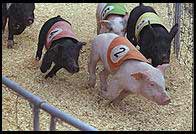Quotations concerning pigs
and speech beyond the usual vernacular

The behavior of pigs can be very unpredictable, and this has necessitated the development of phrases and expressions for discussing pigs that go beyond the usual vernacular.
An examination of these speech forms shows the peculiar character, even genius, of both the pigs and the folks that discuss them.
Pigmalion’s first out of the box, with the lead on the rail. Hamtrak settles into second, with Flying Frank third… Here comes Boaris Karloff on the outside, closing fast around the final turn!
Roy Holding
A former advertising director for Heinold Hog Market of Kouts, Indiana. Frank became the developer, trainer and announcer for Heinold’s annual promotional pig races at the Illinois State Fair. TIME Magazine, ‘Porcine Pacers’ Monday, Aug. 25, 1986.
Watch out w’en you’er gittin all you want. Fattenin’ hogs ain’t in luck.
Joel Chandler Harris (1848-1908)
U.S. journalist. “Plantation Proverbs” in Uncle Remus: His Songs and His Sayings (1880).
It was part of the Texas ritual. we’re rich as son-of-a-bitch stew but look how homely we are, just as plain-folksy as Grandpappy back in 1836. We know about champagne and caviar but we talk hog and hominy.
Edna Ferber (1887-1968)
U.S. author. Giant (1952).
A peasant becomes fond of his pig and is glad to salt away its pork. What is significant, and is so difficult for the urban stranger to understand, is that the two statements are connected by an “and” not by a “but.”
John Berger (b. 1926)
British author and critic. From the essay “Why Look at Animals?” in About Looking (1980).
There are Arocouns, and Apossouns, in shape like to pigges, shrowded in hollow roots of trees…
‘Arocouns’, and ‘Apossouns’ are Algonquian Indian words for the raccoon and opossum respectively. The Jamestown colonists, never having seen such creatures, referred to them by these Algonquian names and created written English words to reproduce the Algonquian’s spoken language. It is also worth remembering that the farm “pigges” of the 1600s were a much more feral looking creature, with longer hair, and a darker complexion — very unlike the stereotypic round pink pigs of today.
A True Declaration of the estate of the Colonie in Virginia
Published by advise and direction of the Councell of Virginia (1610).
Tout est bon dans le cochon!
[All of the pig — from head to tail — is good.]
Anonymous
A rural French expression associated with the “Fete du Cochon,” a Sunday ritual gathering of family and friends following the slaughter of a pig, where every dish of the meal will contain some part of the pig.
Two thangs I ain’t going to do: love no niggers or scoot down no hog with no hose.
(Mary) Flannery O’Connor (1925-1964)
U.S. author. From the short story “Revelation” in Everything That Rises Must Converge (1965).
A farm is a peculiar problem for a man who likes animals because the fate of most livestock is that they are murdered by their benefactors. The creatures may live serenely but they end violently, and the odor of doom hangs about them always.
I have kept several pigs, starting them in spring as weanlings and carrying trays to them all through the summer and fall The relationship bothered me. Day by day I became better acquainted with my pig, and he with me, and the fact that the whole adventure pointed toward an eventual piece of double-dealing on my part lent an eerie quality to the thing.
E. B. White (1899-1985)
In a letter to Bennet Cerf that was reprinted in Cerf’s column “Trade Winds” in the Saturday Review (1979).
Impressive enough was it to hear, in early morning, the Swineherd’s horn; and know that so many hungry happy quadrupeds were, on all sides, starting in hot haste to join him, for breakfast on the Heath. Or to see them at eventide, all marching in again, with short squeak, almost in military order; and each, topographically correct, trotting off in succession to the right or left, through its own lane, to its own dwelling; till old Kunz, at the Village-head, now left alone, blew his last blast, and retired for the night.
We are wont to love the Hog chiefly in the form of Ham; yet did not these bristly thick-skinned beings here manifest intelligence, perhaps humor of character; at any rate,a touching, trustful submissiveness to Man, — who, were he but a Swineherd, in darned gabardine, and leather breeches more resembling slate or discolored-tin breeches, is still the Hierarch of this lower world?
Thomas Carlyle (1795-1881)
Scottish historian, social critic and essayist. Sartor Resartus, The Life and Opinions of Herr Teufelsdrockh (1831).
They even took a pig scraper. You know, the thing you use to get the hair off the pig. I had never even used it.
Ms. Helen Myers, of Fisher, Pennsylvania.
Quoted in “Burglars Target Old Homes,” an article in The Holland Sentinel, Friday, December 4, 1998. The article detailed how burglars, with the precision of professional movers, were carting off thousands of dollars in antiques from homes in rural Pennsylvania.

